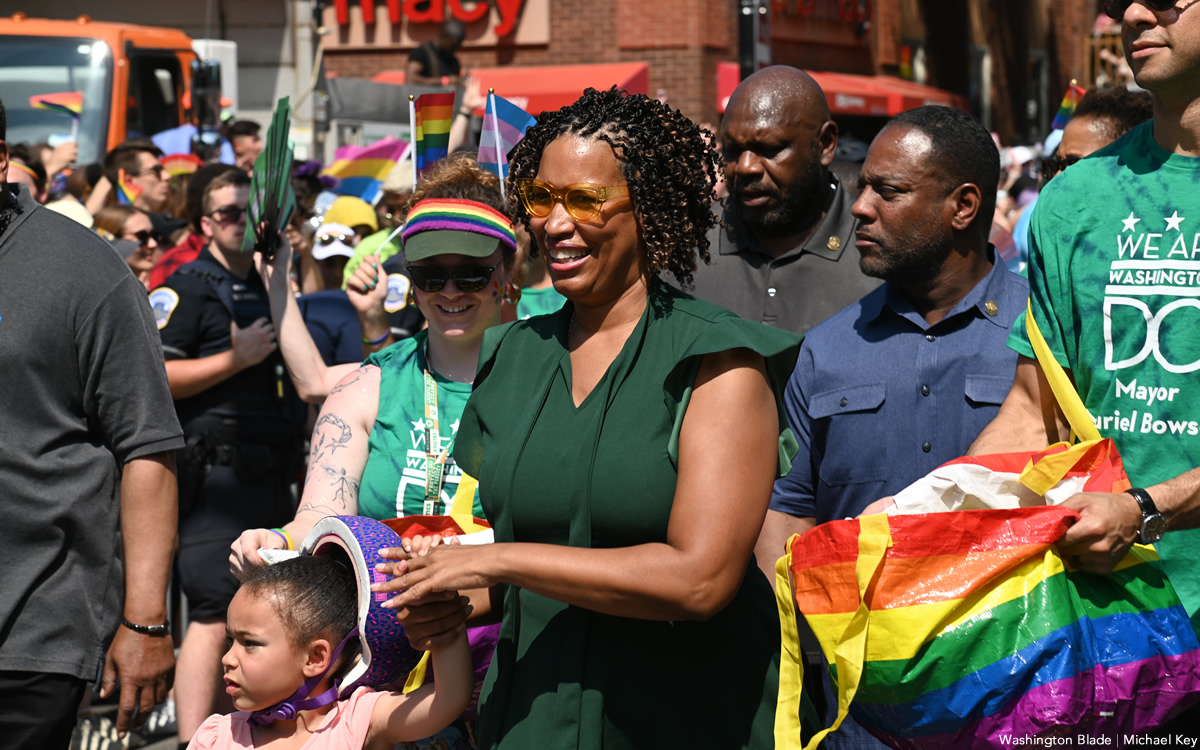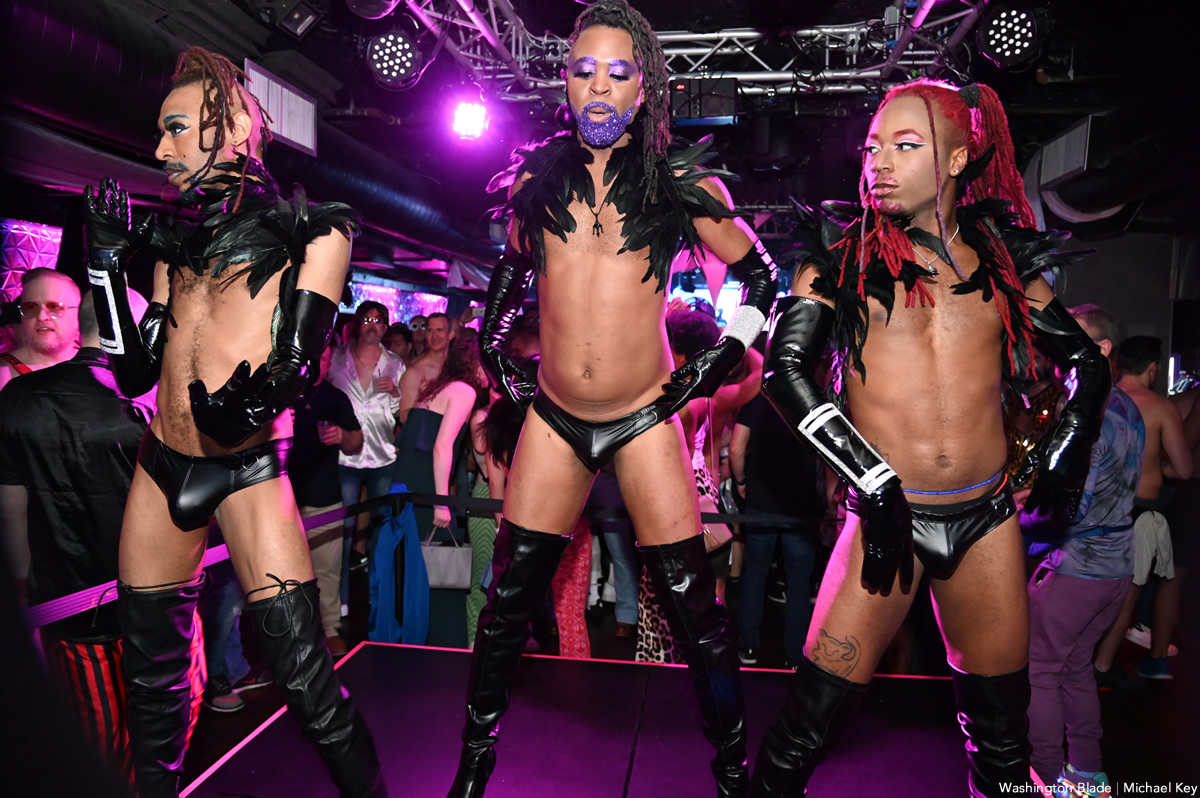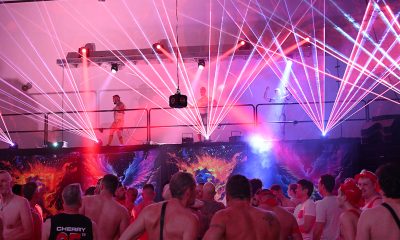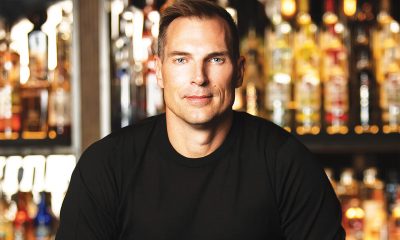District of Columbia
Spark Social House: D.C.’s first non-alcoholic LGBTQ bar debuts
New LGBTQ ‘bar’ is redefining sober nightlife looks on 14th and U Streets

The intersection of 14th and U Streets has become a focal point of Washington’s growing LGBTQ presence.
As the city’s LGBTQ population has steadily increased, the intersection has reflected this shift. Since the end of the COVID-19 pandemic, it has emerged as one of the gayest corners in D.C.
The transformation accelerated with the opening of Bunker, an LGBTQ dance bar that fulfilled the longtime wish of many queer Washingtonians for a new gay dance club after the city lost two beloved venues — Town Danceboutique and Cobalt — before the pandemic. Since then, the corner has only grown more queer.
Three other LGBTQ bars have opened at the intersection of 14th and U since Bunker debuted in 2023: Crush Dance Bar, District Eagle, and, most recently, Spark Social House. Each of these venues offers a distinct environment for Washington’s LGBTQ community to socialize and connect. However, the newest addition to the corner is taking a different approach by removing one key element that ties the others together: Spark is an alcohol-free bar.
Nick Tsusaki, founder of Spark Social House, sat down with the Washington Blade to discuss what sets Spark apart from other LGBTQ spaces in the city, and how his experience working in LGBTQ nightlife has set him up for success.
“I had been bartending at some of these other [gay] bars when I decided, ‘Oh, maybe I could open one too and this could be my whole life,’” Tsusaki said. “I didn’t want to compete against my friends. I tried to think about it, and I noticed alcohol isn’t really me. So I was like, ‘Okay, well, what can I bring to the table that’s filling a gap? And that’s not taking any business from right next door, Crush?’ Those are my friends. And so the way I thought about it was ‘What’s missing in D.C.?’ And it was when I realized ‘Oh, we don’t really have a daytime place to hang out.’
Spark Social House, created by Tsusaki and Shua Goodwin, is Washington’s first LGBTQ alcohol-free bar.
By day, the staff serves coffee and tea, creating a cozy café atmosphere where you can work ‘from home.’ By night, the space transforms into a vibrant sober party spot — complete with DJs, dancing, and an emphasis on expertly crafted mocktails.
“It took us a really long time to figure out what to call it, because there really isn’t another kind of space like this,” Tsusaki said. “That’s why we just ended up going with house. I want you to feel like you’re coming over to our house for a hang out.”
One of the major reasons the pair decided not to include alcohol in Spark was because of Tsusaki’s personal experiences with alcohol when he was younger.
“I myself don’t really drink that much,” Tsusaki said. “Basically, because I’m Asian, I get Asian glow,” he continued, laughing. “I tried so hard in college to fit in. I remember on my 21st birthday I was supposed to go to Town and have fun with all my friends. So I drank and then fell asleep on the couch because my body just doesn’t process alcohol well.”
His lack of a relationship with alcohol only grew after he began working.
“Then for the next eight years of my life, I was almost involuntarily sober because I was in the military. I couldn’t do drugs, and my body couldn’t tolerate alcohol. I just had to figure out how to have fun without that. And then my ex boyfriend, who is part of the Spark team, is sober. That’s really when I realized, like, ‘This is a huge community that isn’t coming out.’”
People choose sobriety for many reasons; whether to prioritize their health, save money, or simply prefer an alcohol-free lifestyle. Ultimately, it’s a personal decision. One reason that LGBTQ individuals may choose to become sober is because they are more likely to engage with alcohol abuse than their straight counterparts. Alcohol abuse within the LGBTQ community may be as high as 25 percent, compared to 5–10 percent in the general population, according to recent research conducted by the American Addition Center.
“One statistic that I found when I was doing my market research for this was that 38% of American adults don’t drink alcohol for whatever reason,” Tsusaki said. “Having bartended at four bars now around the city, Dacha, Dirty Goose, Shakers, and Crush next door, we would always get asked, ‘Oh, do you have any mocktails?’ And there was always a twang or tinge of shame when people would ask for that.”
Tsusaki hopes that by creating a space dedicated to queer nightlife without alcohol, he can help shift the culture — making it easier for people to embrace sober socializing without shame.
“It’s [LGBTQ nightlife] very difficult for somebody who’s sober. I was always so impressed with how he [my ex] navigated it. Being sober in these spaces can be difficult when you don’t have a buzz going on. And so I figured there’s a lot of people that like that. Alcohol is not a requirement for hanging out with your friends. I don’t have alcohol in my house, so when they come over we just make tea and we hang out and chat. That’s kind of the vibe.”
Another group that is now invited to take space in Spark that had not been given the opportunity to in the past is younger members of the LGBTQ community.
“What’s really cool about being non alcoholic is that we now can have anybody come in,” Tsusaki said. “We’re gonna be 18 and up after 9 p.m. but during the day we’ll be in a space where any queer person under 21, any college student, can come and experience being in a queer space. Anyone under 21 previously didn’t really have access to a queer space. We know that the highest risk of suicide is in LGBTQ youth, from 10 to 14. For me, when I went to Town for the first time when I was 18, that was the first time that I was like, ‘Oh, being gay could actually be cool. Like, this is actually kind of cool. This could be a really fun life.’ I’m excited that other people might be able to have that moment earlier in their life.”
David Draper was one of the invited guests to Spark’s soft opening on March 7. While sipping “The Wanda, Not Cosmo” in the sitting room past the bar he told the Blade this is a needed space in Washington’s LGBTQ scene.
“I’m friends with Shua and Nick, and I was grateful to be invited,” Draper said. “I’m also on a new sobriety journey within the last year, and excited. I wanted to support my friends, but also wanted to see this space. Just because you start a sobriety journey doesn’t mean you stop liking to go out. I still enjoy going out, and I am just excited to have a unique space like this.”
The space, Draper went on to explain, will help provide a space for members of the LGBTQ community who had been left to the side of an alcohol-centered culture.
“It makes me feel great. I think a lot of people are looking for options when they’re going out,” he said. “And I think the traditional gay bar is important, and an important part of gay culture and gay life, but I think there’s somewhat of a culture shift, as people have started abstaining from alcohol and other substances. So I think it’s cool to have a space like this”
Jerry Krusinski was sitting across from Draper, sipping on another signature mocktail, the “Jalapeño Business” that uses zero proof tequila.
“I’m pretty newly sober — like just over a month, and so I’m still just kind of exploring what that life means,” Krusinski said. “It’s been really surprising to me how much is actually out there. When you’re not in the sober community, you don’t really see it that much. It’s kind of comforting to see that the world has really kind of embraced it a lot more than I feel like its used to. It leaves me excited for the future.”
Spark Social House is located at 2009 14th St., N.W, and opens daily at 8 a.m. It closes at 10 p.m. Monday through Wednesday, 11 p.m. on Thursday and Sunday, and midnight on Friday and Saturday. For more information visit their website at https://spark-dc.com/ or their Instagram @sparksocialdc.
District of Columbia
Reenactment of 1965 gay rights protest at White House set for April 17
Event to mark 60th anniversary of historic picketing

D.C.’s Rainbow History Project is inviting members of the local LGBTQ community and its supporters to participate in a reenactment of what it calls the historic 1965 first gay rights protest outside the White House.
The event is scheduled to begin at 4 p.m. Thursday, April 17 on the sidewalk in front of the White House.
In a statement, Rainbow History Project says the 1965 protest was organized by local gay rights pioneers Frank Kameny and Lilli Vincenz on behalf of the Mattachine Society of Washington, one of D.C.’s first gay rights groups that Kameny co-founded in the early 1960s.
“Led by Dr. Kameny and Dr. Vincenz, picketers demanded action on the Mattachine Society’s four major issues: the exclusion of homosexuals from Federal employment; the punitive policies of the U.S. Military; blanket denial of security clearances to gay people; and government refusal to meet with the LGBTQ community,” the statement says.
The statement referred to the titles of Kameny and Vincenz in connection with their academic doctorate degrees
“Although Dr. Kameny died in 2011, and Dr. Vincenz in 2023, Rainbow History Project and its all-volunteer corps will picket in their honor and demonstrate there is a new generation of young activists ready to take up their signs and their fight for equal rights for all LGBTQ people,” the statement says.
Among those expected to participate in the April 17 White House reenactment picketing is longtime D.C. LGBTQ rights advocate Paul Kuntzler, who is the last known survivor of the 1965 White House gay rights protest. Kuntzler was expected to carry a picket sign similar to the one he carried in 1965.
In its research on the 1965 gay White House protest, Rainbow History Project learned of a letter that Kameny sent to then President Lyndon B. Johnson outlining the demands of the White House protesters.
“We ask, Mr. President, for what all American citizens – singly and collectively – have the right to ask,” the Kameny letter states. “That our problems be given fair, unbiased consideration…consideration in which we, ourselves, are allowed to participate actively and are invited to do so.”
The RHP statement says the group “will carry replicas of the original protest signs and hand out literature explaining the picket to passersby and tourists.”
District of Columbia
Final push to raise funds, fill D.C. hotels as WorldPride nears
‘We would have liked to see the city fully sold out at this point’

A final push to raise money and fill D.C. hotel rooms is underway with WorldPride 2025 just over a month away.
The Capital Pride Alliance, the D.C.-based group that’s organizing WorldPride 2025 in the nation’s capital that’s scheduled to take place May 17-June 8 launched what it says is one of several fundraising campaigns in a full-page ad in the Washington Post on April 1.
With a large headline declaring, “Hate Is No Joke,” a message in the ad states, “Decades of progress in human rights are under coordinated, systematic attack. Today it’s focused on gender, sexual orientation, and race. But what’s next?”
The message then states, “Take Action. Take a stand. Donate now at WorldPrideDC.org/give.”
That site says its goal is to raise $2 million. As of April 14, the site says $12,041 had been raised from 69 donors.
In response to a request by the Washington Blade for comment on what prompted this particular fundraising campaign, Capital Pride Alliance released a statement saying the campaign was part of its ongoing effort to promote WorldPride and its multiple events.
“The Hate Is No Joke campaign is one of multiple fundraising campaigns that have been planned around the lead-up to WorldPride 2025,” the statement says. “Similar to CPA’s annual Giving Tuesday campaign and the current Taste of Pride citywide initiative, this campaign is intended to raise awareness for and funds to support WorldPride.”
The statement says the “Hate Is No Joke” campaign is being led by the local event planning company Linder Global Events, which D.C. Mayor Muriel Bowser retained to work with Capital Pride Alliance in organizing WorldPride 2025.
Capital Pride Alliance Executive Director Ryan Bos told the Blade last month that CPA had set up a budget of between $15 million and $20 million for WorldPride 2025, with much of the funding coming from corporate donors. At the request of Mayor Bowser, the D.C. Council approved $5 million in city funding for WorldPride.
“And like we do every year for an organization like ours, which is event based, we do our best every year to come under budget,” Bos said in referring to the city’s annual Capital Pride celebration and events. “So, we are doing our best to save whenever we can and to ensure that we have a safe and successful WorldPride,” he said.
In its statement responding to the Blade’s inquiry about the Hate Is No Joke fundraising campaign, Capital Pride Alliance said it has learned through the international LGBTQ advocacy organization InterPride, which plays a role in organizing WorldPride events, that visitors from at least 20 countries were expected to come to D.C. for WorldPride 2025.
Among those countries were Canada, Mexico, and several others from Europe, Asia, and Africa, including Uganda and Zimbabwe, as well as India, Spain, Italy, United Kingdom, China, and Thailand.
Elliott Ferguson, president and CEO of Destination D.C., an organization that promotes tourism, visitation, and events in D.C., including events like WorldPride, said he is seeing signs that hotel reservations are increasing from visitors planning to come to D.C. for WorldPride. But he said he cannot predict whether as many as 2 million or more visitors will come as WorldPride organizers had predicted earlier this year.
At Capital Pride Alliance’s suggestion, Ferguson spoke with the Blade to address the question of whether the controversial statements and policies of President Donald Trump on world trade issues and tariffs involving longtime U.S. allies like Canada and Mexico as well as the Trump administration’s hostile policies targeting the transgender community would prompt people, especially those from foreign countries, to choose not to come to D.C. for WorldPride.
“I’m not sure,” Ferguson told the Blade in an interview. “You know, I think that’s the gray area in terms of how many people will come,” he said.
“But reservations are being made. We’re seeing more of an uptick,” he told the Blade. “And we remain optimistic as WorldPride organizers and Capital Pride organizers are really focusing on the celebration of the community that’s happening in the city,” he said.
Ferguson said he and Destination D.C. were joining WorldPride organizers in putting out the message that if people disagree with the Trump administration’s policies on LGBTQ-related issues or any other issues, they should turn out for WorldPride to protest those policies.
Capital Pride officials have pointed out that among the many events planned for WorldPride is a national LGBTQ rights march on Washington that will begin at the Lincoln Memorial and travel to the U.S. Capitol.
“There’s a lot of consternation and concern about a lot of issues that have been brought to our attention by a lot of international travelers, including those that were looking at coming for WorldPride,” Ferguson said.
“What we’ve said to them is, you know, coming to WorldPride from a global perspective focusing on freedom of speech and First Amendment rights here in the U.S. is a huge part of why you should be here,” he added.
“So, as we talk to hotels, we would have liked to see the city fully sold out at this point,” he said. “But we are seeing momentum in terms of reservations being made and people coming to Washington.”
District of Columbia
D.C. parties with a purpose for Cherry Weekend
LGBTQ community to benefit from money raised

Washington’s queer community will have the opportunity to party with a purpose this weekend as Cherry Weekend returns to raise money for LGBTQ organizations in D.C.
Cherry Weekend is an annual celebration of parties, DJs, and drag that gives the LGBTQ community a chance to let their hair down, dance, drink and be merry-while supporting some of the city’s most vulnerable queer residents through the Cherry Fund.
This year’s Cherry Weekend runs April 11-13, with four parties, eight DJs and one iconic drag performance from Detox, a former “RuPaul’s Drag Race” contestant, all in support of the Cherry Fund.
Founded in 1996 by local LGBTQ residents, the Cherry Fund raises money to make Washington a safer and more inclusive place for LGBTQ people to live, grow and thrive. Cherry Weekend is the nonprofit’s flagship fundraising event, supporting LGBTQ community members living with HIV and those struggling with mental health challenges.
The Cherry Fund has donated to a wide range of D.C.-based organizations over the years. This year, proceeds will support the DC LGBTQ+ Community Center, and the ReelAbilities Film Festival of Greater Washington, which promotes “awareness and appreciation of the lives, stories and artistic expressions of people with disabilities.”
As the longest-running 501(c)(3) nonprofit circuit party organization in the U.S., the Cherry Fund has a reputation to uphold-and in 2025, it’s doing so with four “CHERRY ELEMENT”-themed dance parties across the city.
The weekend kicks off at 11 p.m. Friday with the “AIR” party at DC9 Nightclub (1940 9th St., N.W.) in Shaw. DJs Orel Sabag (Israel) and Jake Maxwell (U.S.) will spin music to “elevate your spirit and unite your soul in a celebration of the CHERRY element.”
Saturday night brings the main event: The “FIRE” party at Betty in Brentwood (1235 W St., N.E.), featuring Detox, along with DJs Tezrah (U.S.) and Las Bibas from Vizcaya (Brazil). From 10 p.m. to 4 a.m., “scorching beats” and a fiery atmosphere will heat up the dance floor.
After the smoke clears, Flash Nightclub in Shaw (645 Florida Ave., N.W.) will host the “EARTH” after-party from 4-8 a.m. Sunday, with DJs Calagna (U.S.) and Ed Wood (Puerto Rico) providing the soundtrack.
The weekend wraps Sunday night with the “WATER” party at Bunker (2001 14th St., N.W.), where DJs Chord (U.S.) and Jesus Montanez (Mexico) will play “cool, flowing beats” from 10 p.m. to 2 a.m.
Tickets and a full schedule are available at CherryDC.com. To learn more about the Cherry Fund, visit CherryFund.org.
-

 District of Columbia5 days ago
District of Columbia5 days agoWorldPride organizers may warn trans people from abroad not to attend event
-

 Opinions4 days ago
Opinions4 days agoIt’s time for new leadership on the Maryland LGBTQIA+ Commission
-

 The White House4 days ago
The White House4 days agoWhite House does not ‘respond’ to reporters’ requests with pronouns included
-

 Noticias en Español4 days ago
Noticias en Español4 days agoINDIGNACIÓN: ¡El transfeminicidio de Sara Millerey en Colombia nos cuestiona como sociedad!












